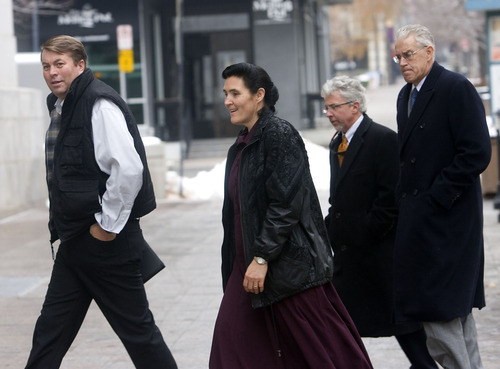This is an archived article that was published on sltrib.com in 2010, and information in the article may be outdated. It is provided only for personal research purposes and may not be reprinted.
A federal judge is considering whether to block the sale of property from a polygamous sect's communal trust based on the argument that the 2005 state takeover of the trust violated the constitutional separation of church and state.
U.S. District Judge Dee Benson told attorneys on Friday to work out a compromise by Wednesday on the sale of Berry Knoll Farm, a piece of property held by the United Effort Plan Trust. A deadline for bids on the property is set for Dec. 13.
Attorneys for 6,000 members of the Fundamentalist Church of Jesus Christ of Latter Day Saints are asking Benson for an injunction removing the states of Utah and Arizona from the United Effort Plan Trust and preventing the sale of the approximately 700-acre parcel in southern Utah.
"They took over and ran a religious institution," said Rod Parker, an attorney for the FLDS. "They disassembled and ran it."
In a Friday hearing, Parker argued that because FLDS members believe in the religious principal of holding property communally, the 2005 state takeover of the trust holding that property was a violation of their right to religious freedom.
Attorneys for the Attorney General's Offices in Utah and Arizona and the accountant appointed to administer the trust argued that the trust always had a secular purpose of caring for the people's "wants and needs," along with its religious significance. Because the Utah Supreme Court has already ruled against the church on the issue and the case is still working its way through state court, they said the federal judge does not have jurisdiction
"There are significant disputes going on," in the communities, said Arizona Assistant Attorney General Bill Richards. "If you enter into an injunction, that's only going to get worse."
Created in the 1940s, the trust holds most of the property in the twin cities of Hildale, Utah, and Colorado City, Ariz., and a settlement in British Columbia. It is valued at about $110 million.
The state took over the trust after trustees did not respond to lawsuits targeting its assets. The state feared people would lose their homes due to the litigation. Third District Judge Denise Lindberg later changed the terms of the trust to remove religious considerations, partly to avoid running afoul of the establishment clause.
But on Friday, Benson repeatedly questioned state lawyers about the legal justification for the takeover.
"The question is, does that decision violate the U.S. Constitution?" he said. "All the rest of it is just smoke and mirrors."
He said if the two parties did not reach a compromise by Wednesday, Benson said he might freeze the sale of the farm until he made a decision on the issue.
This isn't the first time the trust has been in Benson's court. In 2008, after three years of inaction, the FLDS filed suit to protest the sale of Berry Knoll Farm, which they said had both religious and economic significance to the community.
Benson decided then to let the state court system work it out.
Berry Knoll farm
The hotly contested sale process on the property started about two weeks ago. Threatening to freeze the sale process, U.S. District Judge Dee Benson told attorneys for the FLDS and the state to work out a compromise by Wednesday.



